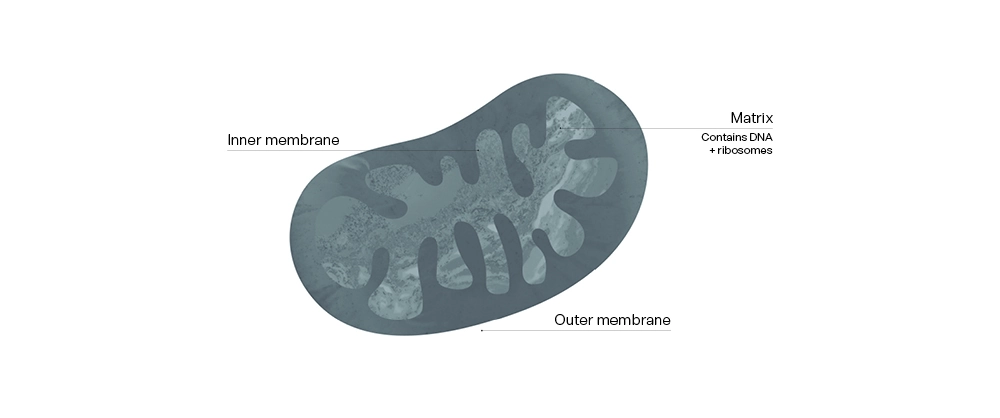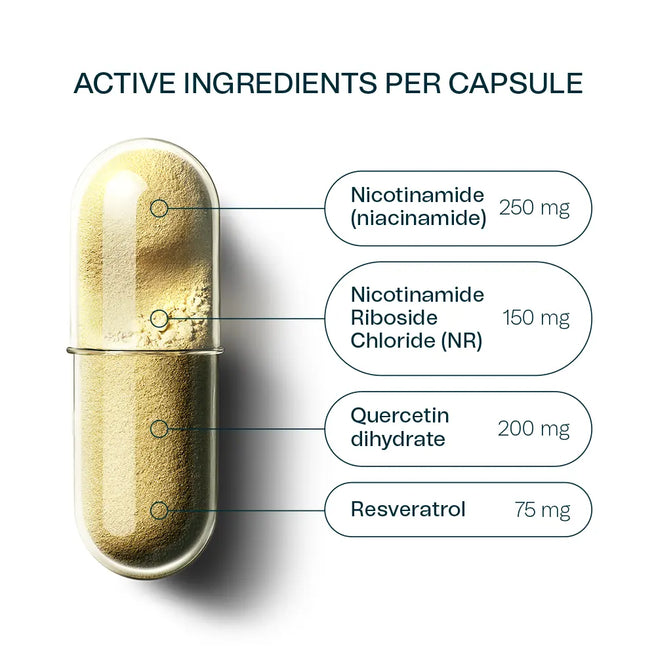And how SynTernals can keep them thriving

Have you ever wondered what fuels your every move, thought, and heartbeat?
The answer lies deep within the trillions of cells that make up your body – a network of tiny powerhouses called mitochondria. Often referred to as the "powerhouse of the cell," these remarkable organelles are the unsung heroes of our health. But what exactly are mitochondria, and how can we support their crucial role in cellular health? This blog intends to provide an overview of the fascinating world of mitochondria, explaining their function and how SynTernals is dedicated to empowering you to optimise your cellular healthspan through science-backed solutions.
What are Mitochondria?
As previously stated, we already know that there are trillions of cells that constitute the human body, but what if we told you that each of your cells was like its own miniature city brimming with bustling subcellular entities? That’s right – within a single average human cell lie thousands of specialised structures called ‘organelles’, each with a dedicated function! These organelles work in concert with other subcellular components within the jelly-like cytoplasm to keep the cellular metropolis functioning optimally.
Mitochondria are one of the many organelles within the cell, and they behave like the power plants within these cities, responsible for generating most of the energy your cells need to function. These energy factories are microscopic, roughly 0.5-1 micrometres in size, and exist in varying numbers depending on the cell type, typically in the thousands. Muscle cells, for instance, have a higher concentration of mitochondria than skin cells due to their high energy demands. Fun fact: the only cells in our body without mitochondria are our red blood cells.

How do Mitochondria Generate Cellular Energy?
The power generation process within mitochondria is called cellular respiration. Here's a simplified breakdown:
Fuel Intake: Mitochondria take in glucose (sugar) from your bloodstream and oxygen you breathe.
Glycolysis: In the cytoplasm (the cellular fluid outside the mitochondria), glucose is broken down into pyruvate, a simpler molecule.
Pyruvate Processing: Pyruvate enters the mitochondria, where it undergoes further breakdown in a cycle called the Krebs cycle (citric acid cycle).
The Electron Transport Chain: This complex series of protein pumps within the mitochondria utilises the energy released from breaking down pyruvate, oxygen and a vital molecule called NADH (the electron loaded form of NAD+/Nicotinamide adenine dinucleotide) to create an electrochemical gradient. Think of it as a waterfall generating electricity.
ATP Production: Using the energy from the gradient, mitochondria create adenosine triphosphate (ATP), the universal energy currency of cells. ATP fuels all our cellular processes, from muscle contraction to nerve impulses.
Now you can see we really mean it when we call the mitochondria ‘the powerhouse of the cell’!

Why is Mitochondrial Health Important?
As we age, mitochondrial function generally declines but there are other factors at play that can accelerate this decline, such as environmental factors, stress, and dietary limitations. This can lead to a decrease in cellular energy production, impacting various bodily processes.
Here's why maintaining healthy mitochondria is crucial:
Energy Production: Optimal mitochondrial function ensures your cells have the energy they need to perform their tasks effectively.
Cellular Repair and Renewal: Mitochondria play a role in cellular repair and renewal processes.
Metabolism: Mitochondria are involved in regulating metabolism, the process by which your body converts food into energy.
Reduced Risk of Chronic Disease: Research suggests that compromised mitochondrial function may be linked to various chronic diseases, including heart disease, diabetes, and neurodegenerative disorders.
While mitochondrial dysfunction is increasingly linked to various chronic diseases, research is ongoing to fully understand these connections and how we scientists can mitigate disease risk.

How Can I Strengthen My Mitochondria?
The good news is that you can take steps to support your mitochondrial health:
Diet: Prioritise a balanced diet rich in diverse plant-based nutrients and high quality protein, fat and fibre. These foods provide essential nutrients that mitochondria need to function optimally. For more information on how diet is linked to health, read our previous article: How Does Gut Health Affect Your Skin?
Exercise: Regular physical activity, both aerobic and resistance-based, increases blood flow, delivering oxygen and nutrients to your cells, including your mitochondria.
Quality Sleep: During sleep, your body repairs and rejuvenates at the cellular level, including your mitochondria. Aim for 7-8 hours of quality sleep each night. This is a non-negotiable!
Manage Stress: Chronic stress can damage mitochondria. Practice relaxation techniques like yoga, meditation or just find your happy place to manage stress and promote cellular health.
Consider Supplementation: Emerging research suggests that if nutrition is sub optimal, specific supplemental nutrients may support mitochondrial health. Consult your doctor about potential benefits and options.

SynTernals: Committed to Cellular Health Solutions
At SynTernals, we are passionate about empowering individuals to optimise their cellular healthspan. We believe that by understanding the powerhouses of our cells – the mitochondria – we can all take a proactive approach to our overall vitality. SynTernals’ commitment to Clean Science emphasises rigorous testing and transparency in research to develop science-backed solutions that support cellular health.
Whilst this article focuses on the importance of mitochondria, SynTernals aims to offer a range of high-performing, Clean Science-backed supplements specifically designed to for optimal cellular health and longevity. As we continue to delve deeper into the fascinating world of cellular health, SynTernals remains dedicated to staying at the forefront of scientific discovery and formulating innovative solutions that empower you to take charge of your cellular healthspan - turning your inside into your best side.
Looking for ways to support your cellular health and potentially strengthen your mitochondria? Explore the science behind our products like the mitochondria supplement NRgize+ and discover how SynTernals can be a valuable partner in your wellness journey. *Always read the label and follow the directions for use.
We invite you to explore our website for in-depth information about our products and the science behind cellular health. Remember, healthy mitochondria are the foundations for a healthier you!
[Disclaimer: Please note that the information provided is for educational purposes only and should not be interpreted as medical advice. Always consult a healthcare professional for personalised recommendations regarding your health.]
Cellular Respiration
Khan Academy. "Cellular Respiration and Fermentation." Khan Academy: https://www.khanacademy.org/science/biology/cellular-respiration-and-fermentation
Accessed 28/03/24. This link leads to a Khan Academy article explaining Cellular Respiration and Fermentation.
Mitochondria
MedlinePlus. "Mitochondria." National Library of Medicine: https://www.genome.gov/genetics-glossary/Mitochondria
Accessed 28/03/24. This link leads directly to the definition of "Mitochondria" on the National Library of Medicine website.
Organelles
National Human Genome Research Institute. "Organelle." National Human Genome Research Institute: https://www.genome.gov/genetics-glossary/Organelle
Accessed 28/03/24. This link leads directly to the definition of "Organelle" on the National Human Genome Research Institute website.






.png?v=1731901011935)